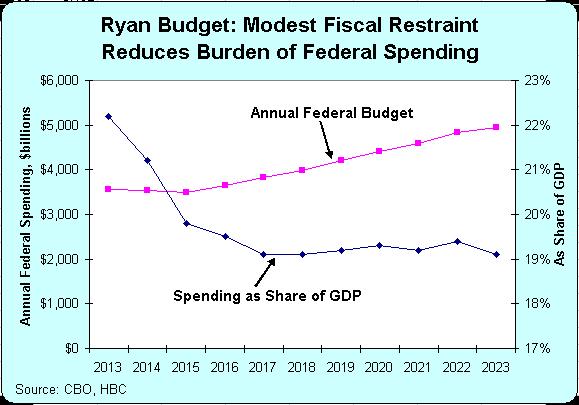Rep. Paul Ryan (R-WI), chairman of the House Budget Committee, released his proposed budget this week. In addition to no new tax hikes,
key features include:
- comprehensive tax reform that would close loopholes and consolidate income tax rates into two brackets: 10% and 25%;
- energy reform that would approve the Keystone Pipeline, open federal land to natural gas development (a supply equal to 90 years of America's needs), create thousands of jobs, deliver millions of new dollars to government treasuries, and put the U.S. on path to full energy independence;
- health care reform that includes repealing Obamacare and strengthening Medicare;
- welfare reform that incentivizes states to help people off welfare rolls and on to payrolls; limiting federal government spending increases to 3.4% per year rather than 5%; and
- a balanced federal budget by 2023.
In contrast,
reports the Hill, "the first budget from Senate Democrats in four years includes nearly $1 trillion in new taxes but would not balance the budget."
The president's budget, now two months behind schedule, is due out in April.

CATO's Dan Mitchell
writes that, although it isn't a libertarian budget, the "Ryan Budget does satisfy the Golden Rule of fiscal policy."
As you can see in the chart, federal spending grows by an average of 3.4
percent annually, and that modest bit of fiscal discipline is enough to
reduce the burden of government spending to 19.1 percent of economic
output by 2023.
It’s also good news that the Ryan Budget calls for structural reform of entitlement programs, including Medicaid block grants and Medicare premium support. The budget also assumes the repeal of the costly Obamacare program.
And there’s also some good tax policy. Not bold tax reform like a flat tax, but top tax rates would be reduced to 25 percent and many forms of double taxation, like the death tax and capital gains tax, presumably would be reduced or eliminated.
Per Mitchell, "the Ryan Budget is a step in the right direction, but much more will be needed to restore limited, constitutional government."







